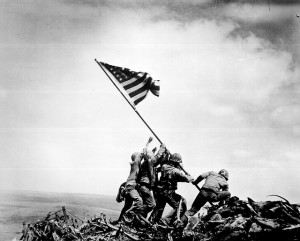
Perhaps no image is more iconic and awe-inspiring to the American spirit than the image of the American flag being hoisted high above the sands of Iwo Jima by the US marines during World War II. The sacrifice of those Americans at Iwo Jima have secured their place in the perpetual saga of patriotic history. We ought to remember daily that their sacrifice on that far-away Pacific island is what secured our freedom. Iwo Jima is a battle for the ages, it is an American military legend and it has become part of what our country stands for: freedom, courage and sacrifice.
The thrust for Iwo Jima was part of the American advance on mainland Japan. The Americans had “island-hopped” from the South Pacific to the fringes of Japan itself in a long, brutal struggle. The island-hopping had not been easy. As much as the past was overwhelming, the American forces were faced with an equally overwhelming future, the invasion of Japan. Iwo Jima was one of the first stops in that gigantic attack. Iwo Jima contained several Japanese airfields and it was the perfect launching pad for bombing raids on Japanese soil.
The American attack on Iwo Jima began in February 1945. The battle was deadly and hard-fought. It was not until the end of March, that victory was achieved. The Japanese culture upheld the values of honor and courage. This led many Japanese soldiers to fight to the death rather than surrender. Furthermore, Iwo Jima was equipped with myriads of tunnels and underground bunkers and fortresses. It was no wonder that the capture of Iwo Jima took so long.
Not only was it a long fight, it was also a costly one. The Americans suffered thousands of casualties. The landing at the beaches of the island were incredibly costly and the seemingly never-ending battle for caves and bunkers was accompanied with even more casualties. The greatest moment of the battle was when American marines raised the US flag over Mount Suribachi, one of the highest peaks on the island. This iconic moment forever immortalized the battle and the sacrifice made by the US marines on the beaches of Iwo Jima.
Interesting Fact of the Week-Serbian-American scientist Nikola Tesla worked for Thomas Edison in the 1880s. Years later, he would become Edison’s greatest rival.
Inspiring Quote of the Week-“The spread of civilization may be likened to a fire; first, a feeble spark, next a flickering flame, then a mighty blaze, ever increasing in speed and power.” -Nikola Tesla
Read more at http://www.brainyquote.com/quotes/quotes/n/nikolatesl403013.html#5gOCJHzFHRmQsW85.99
Read more at http://www.brainyquote.com/quotes/quotes/n/nikolatesl403013.html#5gOCJHzFHRmQsW85.99
